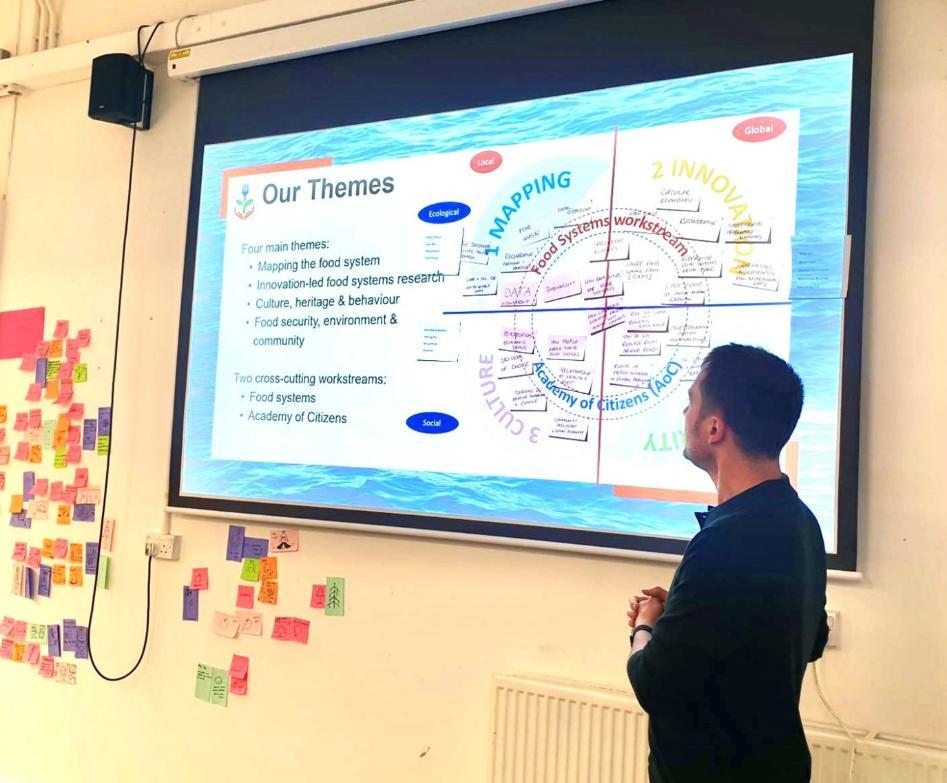Design Innovation | Glasgow School of Art & SCAF | January 24
Published: 3 February 2024
Glasgow School of Art and SCAF are collaborating to apply Design Innovation to explore a just and sustainable food future.
Design Innovation at Glasgow School of Art Launches Masters Project Partnership with SCAF
by Dr Michael Pierre Johnson, Creative Economy Leadership Fellow and GSA Lead for MSc International Management and Design Innovation | The School of Innovation and Technology | The Glasgow School of Art
Glasgow School of Art and SCAF are collaborating to apply Design Innovation to explore a just and sustainable food future for Glasgow.
The MSc International Management and Design Innovation (IMDI) programme is co-delivered between Glasgow School of Art’s School of Innovation and Technology and the University of Glasgow’s Adam Smith Business School, and we have partnered with SCAF on a collaborative brief for the students’ Stage 2 group project.
The brief was launched on 30th January with Prof. Emilie Combet (SCAF director) and asked the students to creatively explore how Glasgow can be a city where good, healthful food is accessible to everyone, while minimising harm to the environment.
We saw the opportunity to link with GALLANT (Glasgow as a Living Lab for Novel Transformation), a research-led partnership programme at the University of Glasgow’s Centre for Sustainable Solutions that is using Glasgow as a living lab to trial new sustainable solutions throughout the city. GALLANT recently supported the development and launch of the Thriving Glasgow Portrait, which presents a vision for the future of Glasgow co-created by many different changemakers across the city in partnership with researchers at the University of Glasgow and colleagues at Glasgow City Council. This collaborative process co-created 44 definitions of the “ideal state” for Glasgow as a Thriving City in relation to the dimensions of the Doughnut Economics framework. Food is only one of these dimensions, but it was identified as deeply interrelated to many others.

For this three-month Design Innovation project, the MSc IMDI students will work with members of SCAF and GALLANT to explore new opportunities for the food system in Glasgow by focusing on four lenses, as outlined by the Glasgow Doughnut, which we have connected to SCAF’s four research themes:
Local-Ecological – Mapping the Food System
How can Glasgow’s food system thrive within its regional natural habitat through local circular and regenerative models of food production and consumption that can minimise or eliminate food waste and environmental impacts? Can we facilitate the establishment of new datasets, practices and technologies to create an accessible and reusable Glasgow food system?
Local-Social – Culture, Heritage & Behaviour
How can all the people of Glasgow have affordable access to nourishing and sustainable food, where there is no food poverty and no need for food banks? Can we create synergistic behaviour change among food system stakeholders to transition into a future-proof food system that respects Scottish food culture and heritage?
Global-Ecological – Innovation-led Food Systems
How can Glasgow respect the health of the whole planet through global circular and regenerative models of food production and consumption that can minimise or eliminate its contribution to environmental impacts? Can we collaborate around the complex global challenges that food waste, processing and reformulation place on the health, safety and identity of our food industry?
Global-Social – Food Security, Environment and Community Cohesion
How can Glasgow’s food system respect the wellbeing of all people by supporting a human rights approach to food for all? What can help ensure food security and increased access to healthful food, reducing food insecurity, considering dignity, community cohesion and the right to sustainable food?
An underpinning piece of work for SCAF is to develop, focused on the translation of culture and experiences to all generations and developing a framework of debate and engagement around diet, food culture and the environment. Design Innovation at GSA promotes participatory forms of engagement and collaboration with users and stakeholders to build upon their primary knowledge and expertise (‘what is’) to envisage preferable scenarios (‘what could be’). In 2024, GALLANT is launching Green Recovery Dialogues focused on Glasgow’s food system, which are network-level events that convene diverse stakeholders around place-based sets of issues to foster a dialogue that has the capacity to hold these diverse sets of perspectives and investments together and to bring them closer to a shared understanding. The students’ work on this brief will help contribute to developing creative approaches for engagement and evidence towards the development of SCAF’s framework for their Academy of Citizens workstream.
First published: 3 February 2024
<< Blog
- Dr Michael Pierre Johnson is a co-lead for the SCAF Academy of Citizen (AOC) workstream
- Get in touch
- Follow us on X
- Follow us on LinkedIn

